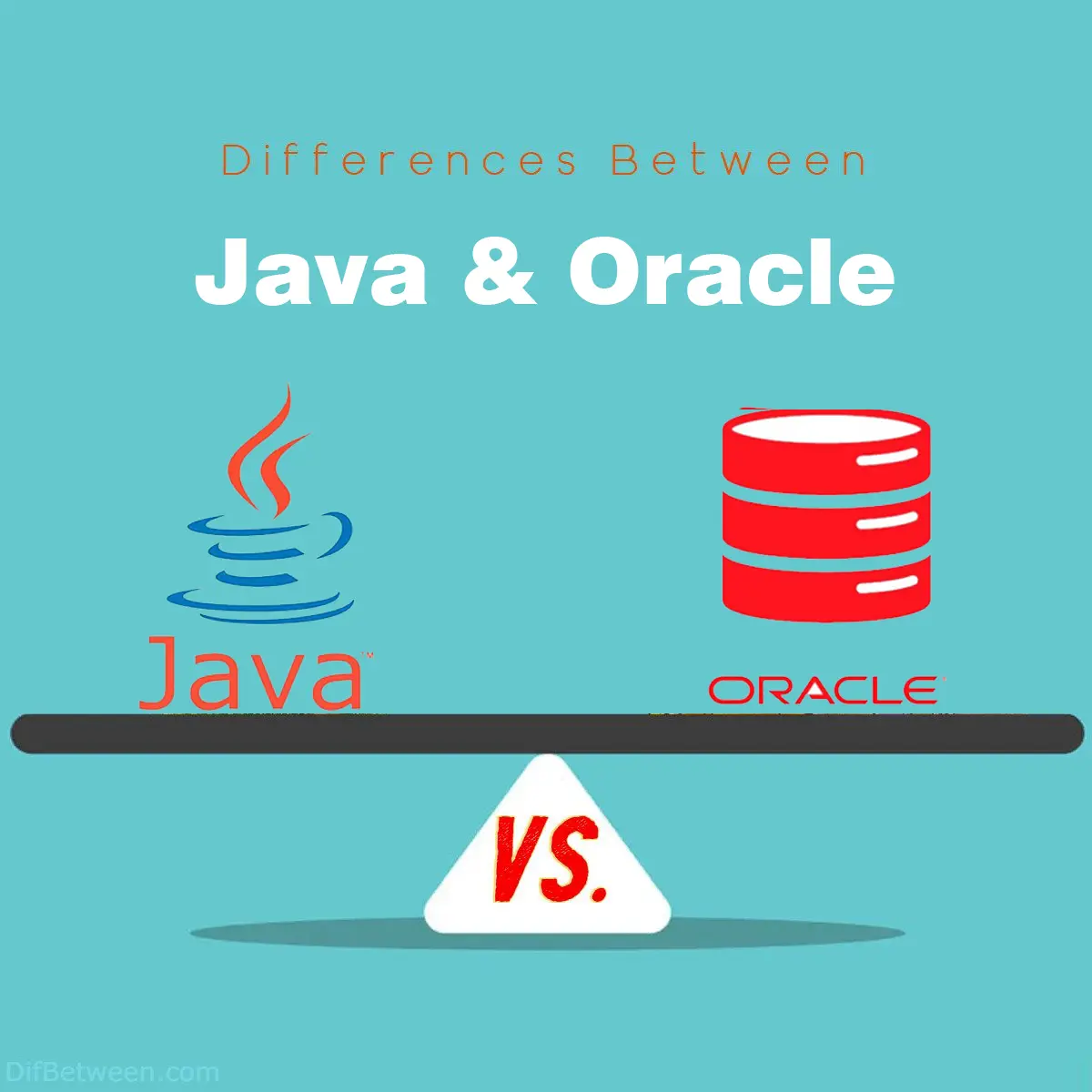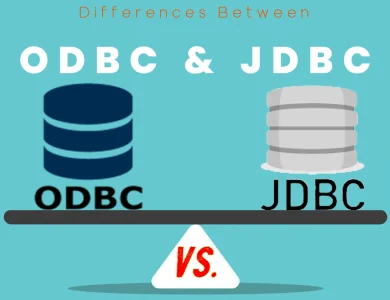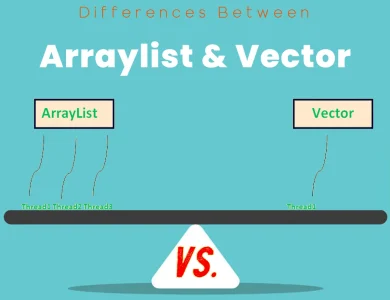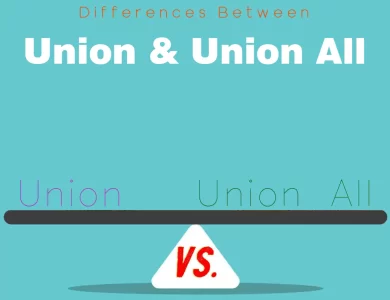
| Aspect | Java | Oracle |
|---|---|---|
| Purpose and Functionality | Programming language for software dev. | Relational database management system |
| Type | Programming language | Database management system |
| Role in Software Development | Used to create software applications | Used to store and manage data |
| Language vs. Platform | Language-centric | Platform-centric |
| Licensing and Cost | Dual licensing model (Oracle JDK) | Paid licensing for commercial use |
| Community and Support | Vast developer community | Smaller community with dedicated users |
| Development Tools and Ecosystem | Rich ecosystem of IDEs and tools | Tools for database and application dev. |
| Portability | Highly portable due to JVM | Less portable, platform-dependent |
| Performance | Good overall performance | High-performance data processing |
| Versioning and Updates | Well-defined versioning system | Regular releases and patching |
| Certification | Java certification programs | Oracle certification programs |
| Integration with Other Technologies | Extensive support for integration | Integration through APIs and middleware |
| Licensing and Legal Aspects | Complex due to dual licensing | Complex licensing terms and policies |
| Vendor and Ownership | Acquired by Oracle in 2010 | Developed and sold by Oracle Corp. |
| Industry Adoption | Widespread adoption in various industries | Commonly used in large enterprises |
Java and Oracle are two distinct entities in the world of software and technology. While they may be related in some contexts, they serve different purposes and have unique characteristics. In this article, we’ll explore the key differences between Java and Oracle, shedding light on their individual features, uses, and significance in the tech industry.
Differences Between Java and Oracle
The main differences between Java and Oracle lie in their core functions and roles within the realm of software and technology. Java is a versatile programming language known for its cross-platform compatibility and application development capabilities, making it ideal for creating a wide range of software applications, from web and mobile apps to enterprise systems. On the other hand, Oracle is a powerful relational database management system (RDBMS) primarily used for data storage, retrieval, and management, making it a pivotal component in industries requiring structured data handling, such as finance and data warehousing. These fundamental distinctions underline the unique purposes and strengths of Java and Oracle in the world of IT.
Language vs. Database
One of the most fundamental distinctions between Java and Oracle lies in their core functions. Java is a programming language, whereas Oracle is a relational database management system (RDBMS). This means they serve entirely different purposes in the world of software development.
Java is used to write, compile, and run software applications. It provides a platform-independent environment, allowing developers to write code once and run it on various platforms without modification. Java applications are typically executed by the Java Virtual Machine (JVM), making them highly portable.
In contrast, Oracle is a database system used for storing, managing, and retrieving data. It offers a structured way to organize and access data, making it an essential tool for businesses and organizations that need to handle large volumes of information efficiently.
1. Purpose and Functionality
Java:
- Purpose: Java is primarily a programming language designed for developing software applications.
- Functionality: It provides a rich set of libraries, frameworks, and tools for writing code that can run on different platforms (Windows, Linux, macOS, etc.). Java is known for its “Write Once, Run Anywhere” (WORA) capability.
- Use Cases: Java is used for developing a wide range of applications, including web applications, mobile apps (Android), enterprise software, scientific applications, and more.
Oracle:
- Purpose: Oracle is a relational database management system (RDBMS) designed for data storage, retrieval, and management.
- Functionality: It offers robust data storage capabilities, data security features, and SQL-based query support. Oracle databases are used to store and manage structured data efficiently.
- Use Cases: Oracle is used in various industries and applications, such as financial systems, e-commerce platforms, supply chain management, and customer relationship management (CRM) systems.
2. Type
Java:
- Type: Java is a programming language.
- Nature: It is a general-purpose language that can be used for a wide range of software development tasks.
- Implementation: Java code is written in text files with a “.java” extension and compiled into bytecode files with a “.class” extension.
Oracle:
- Type: Oracle is a relational database management system (RDBMS).
- Nature: It is a specialized software for managing structured data and ensuring data integrity through the use of tables and relationships.
- Implementation: Oracle databases consist of tables, indexes, and data stored in files on a file system.
3. Role in Software Development
Java:
- Role: Java serves as a programming language for creating software applications.
- Development Process: Developers write Java code, which is then compiled into bytecode. The bytecode is executed by the Java Virtual Machine (JVM).
- Flexibility: Java allows developers to build diverse applications, from simple command-line tools to complex, multi-tier enterprise systems.
Oracle:
- Role: Oracle functions as a database system for storing and managing data used by applications.
- Data Storage: Oracle databases store data in a structured, organized manner, making it accessible for applications via SQL queries.
- Data Integrity: Oracle ensures data integrity by enforcing constraints, transactions, and ACID (Atomicity, Consistency, Isolation, Durability) properties.
4. Language vs. Platform
Java:
- Language-Centric: Java is primarily a programming language with a focus on syntax, libraries, and code execution.
- Platform Independence: Java code can run on any platform with a compatible JVM, making it platform-independent.
- Example Use: You can use Java to develop standalone applications, web applications, mobile apps, and more.
Oracle:
- Platform-Centric: Oracle is a database management system that provides a platform for data storage and retrieval.
- Platform Dependence: Oracle databases are typically tied to specific platforms (e.g., Oracle Database for Linux or Windows).
- Example Use: Oracle is used as the backend database for various applications and systems, including ERP (Enterprise Resource Planning) software and data warehousing solutions.
5. Licensing and Cost
Java:
- Licensing: Java follows a dual licensing model, with the Oracle Binary Code License Agreement (BCLA) for Oracle JDK (Java Development Kit) and the GNU General Public License (GPL) for OpenJDK.
- Cost: While OpenJDK is open source and free to use, Oracle JDK may require a paid subscription for commercial use and support.
Oracle:
- Licensing: Oracle Database is not open source and requires a paid license for commercial use. Oracle offers different licensing models, including options for cloud-based deployments.
- Cost: The cost of Oracle Database depends on factors such as edition, features, and deployment options. It can be a significant expense for organizations.
6. Community and Support
Java:
- Community: Java has a vast and active developer community worldwide. It benefits from contributions and updates from various sources.
- Support: Oracle provides commercial support for Oracle JDK and offers long-term support (LTS) releases. In addition, the Java community provides support through forums, online resources, and third-party vendors.
Oracle:
- Community: Oracle Database has a smaller community compared to Java but still enjoys a dedicated user base.
- Support: Oracle offers comprehensive support for its database products, including technical support, updates, and patches. Users can also find assistance through Oracle’s support services.
7. Development Tools and Ecosystem
Java:
- Development Tools: Java developers have access to a wide range of integrated development environments (IDEs), including Eclipse, IntelliJ IDEA, and NetBeans.
- Ecosystem: Java has a rich ecosystem of libraries, frameworks, and third-party tools that enhance productivity and ease of development.
Oracle:
- Development Tools: Oracle provides tools such as Oracle SQL Developer for database development, Oracle Enterprise Manager for database management, and Oracle Developer Suite for application development.
- Ecosystem: The Oracle ecosystem includes a variety of database-related products and technologies, such as Oracle Cloud, Oracle Exadata, and Oracle Fusion Middleware.
8. Portability
Java:
- Portability: Java is known for its high portability due to the JVM. Code written in Java can be executed on different operating systems with compatible JVM implementations.
- “Write Once, Run Anywhere”: This Java principle allows developers to create applications that are not bound to a specific platform.
Oracle:
- Portability: Oracle databases are less portable than Java applications. They are typically tied to a specific operating system and require migration efforts to move between platforms.
- Data Export and Import: To move an Oracle database to a different platform, data export and import processes are often necessary, which can be complex and time-consuming.
9. Performance
Java:
- Performance: Java applications are known for their good overall performance, thanks to Just-In-Time (JIT) compilation and various optimization techniques.
- Responsiveness: Java applications can be highly responsive, making them suitable for real-time systems and applications requiring quick user interactions.
Oracle:
- Performance: Oracle databases are designed for high-performance data processing, with features like query optimization and indexing.
- Scalability: Oracle databases can scale vertically and horizontally to handle large volumes of data and concurrent users efficiently.
10. Versioning and Updates
Java:
- Versioning: Java has a well-defined versioning system, with major releases followed by minor updates and security patches.
- Long-Term Support: Oracle and other providers offer long-term support (LTS) for specific Java versions, ensuring stability and security for extended periods.
Oracle:
- Versioning: Oracle releases new versions of its database software with updated features and improvements. Customers can choose to upgrade based on their requirements and compatibility.
- Patching: Oracle regularly releases patches and security updates to address vulnerabilities and maintain database security.
11. Certification
Java:
- Certification: Oracle offers Java certification programs for developers and professionals to validate their Java skills and knowledge.
- Types of Certifications: These certifications include Java SE (Standard Edition), Java EE (Enterprise Edition), and others, catering to different aspects of Java development.
Oracle:
- Certification: Oracle offers certification programs for database administrators and developers to demonstrate their expertise in using Oracle Database products.
- Types of Certifications: Oracle certifications cover various aspects, including database administration, SQL development, and database cloud services.
12. Integration with Other Technologies
Java:
- Integration: Java provides extensive support for integrating with various technologies, including web services (SOAP, REST), databases (JDBC), and messaging systems (JMS).
- Versatility: Java’s versatility allows it to be used in conjunction with multiple technologies and platforms.
Oracle:
- Integration: Oracle databases can be integrated with a wide range of technologies and applications through APIs, connectors, and middleware solutions.
- Ecosystem Integration: Oracle offers a comprehensive suite of products that facilitate integration, including Oracle Integration Cloud and Oracle SOA Suite.
13. Licensing and Legal Aspects
Java:
- Licensing: Java’s licensing terms can be complex due to the dual licensing model (Oracle JDK vs. OpenJDK) and evolving changes in Oracle’s licensing policies.
- Legal Aspects: Organizations need to carefully assess their usage of Oracle JDK in commercial projects to ensure compliance with licensing agreements.
Oracle:
- Licensing: Oracle’s licensing terms and pricing can be intricate, and organizations must understand and adhere to Oracle’s licensing policies to avoid legal issues.
- License Management: Proper license management and compliance are crucial to prevent unexpected costs and legal challenges when using Oracle Database.
14. Vendor and Ownership
Java:
- Vendor: Java was originally developed by Sun Microsystems, which was later acquired by Oracle Corporation in 2010.
- Ownership: Oracle is the current owner and steward of the Java platform, overseeing its development and updates.
Oracle:
- Vendor: Oracle Corporation is the developer and vendor of Oracle Database and associated products.
- Ownership: Oracle retains full ownership and control over Oracle Database, offering it as a commercial product.
15. Industry Adoption
Java:
- Industry Adoption: Java has widespread adoption across various industries, making it one of the most popular programming languages globally.
- Open Source Initiatives: Java’s open-source counterpart, OpenJDK, has further contributed to its adoption, especially in open-source communities.
Oracle:
- Industry Adoption: Oracle Database is commonly used in large enterprises and organizations that require robust data management solutions.
- Specialized Usage: While prevalent in certain sectors, such as finance and healthcare, Oracle Database is not as universally adopted as Java.
Java or Oracle : Which One is Right Choose for You?
Choosing between Java and Oracle depends on your specific needs and objectives in the world of software and technology. These two entities serve different purposes, and the decision should align with your project requirements, goals, and expertise. Let’s explore scenarios where each might be the right choice:
Choose Java If:
- Application Development: If your primary goal is to develop software applications, whether they are web applications, mobile apps (especially for Android), or enterprise-level systems, Java is an excellent choice. It offers a versatile platform for building a wide range of applications.
- Cross-Platform Compatibility: If you require your software to run on multiple platforms without modification, Java’s “Write Once, Run Anywhere” capability, facilitated by the Java Virtual Machine (JVM), makes it an ideal choice.
- Rich Ecosystem: Java has a robust ecosystem of libraries, frameworks, and development tools that can significantly boost productivity and ease of development. Popular IDEs like Eclipse, IntelliJ IDEA, and NetBeans support Java development.
- Community and Support: Java benefits from a vast and active developer community. You can find abundant online resources, forums, and third-party vendors offering support and solutions.
- Certification: If you want to validate your Java skills or demonstrate your expertise, Oracle offers certification programs for various aspects of Java development, enhancing your professional credentials.
- Performance: Java applications are known for their good overall performance and responsiveness, making them suitable for real-time systems and interactive user experiences.
Choose Oracle If:
- Data Management: If your primary concern is data storage, retrieval, and management, Oracle is a top choice. It excels as a relational database management system (RDBMS) for handling structured data efficiently.
- Database-Driven Applications: When developing applications that heavily rely on data, such as financial systems, e-commerce platforms, customer relationship management (CRM) systems, or data warehousing solutions, Oracle databases are a natural fit.
- Data Integrity and Security: Oracle databases offer robust features for ensuring data integrity, enforcing constraints, and providing security. This is critical for organizations that handle sensitive data.
- Scalability: If your application is expected to scale both vertically and horizontally to accommodate a growing user base or increasing data volumes, Oracle databases can handle this level of scalability effectively.
- Integration: Oracle databases can seamlessly integrate with various technologies, including middleware solutions, APIs, and connectors. This makes them suitable for complex enterprise architectures.
- Licensing and Compliance: If your organization has the budget and resources to invest in Oracle licensing and is committed to maintaining compliance, Oracle is a viable choice. However, it’s crucial to understand Oracle’s licensing terms and policies.
In many real-world scenarios, you might find a need for both Java and Oracle. Java can be used to develop the frontend or backend of an application, while Oracle can serve as the backend database to store and manage the application’s data.
Ultimately, the decision between Java and Oracle should be driven by your project’s specific requirements, your team’s expertise, and your organization’s priorities. It’s also important to stay informed about the latest developments and trends in both Java and database management to make informed choices that align with your long-term goals.
FAQs
Java is a versatile programming language developed by Sun Microsystems, now owned by Oracle Corporation. It is used for a wide range of applications, including web development, mobile app development (especially for Android), enterprise software, and scientific computing. Java is known for its platform independence, making it suitable for writing code that can run on different operating systems.
Oracle is a relational database management system (RDBMS) developed and sold by Oracle Corporation. Its primary purpose is to store, manage, and retrieve structured data efficiently. Oracle databases are commonly used in industries that require robust data management, such as finance, e-commerce, and healthcare.
Java has both open-source and commercial versions. OpenJDK (Java Development Kit) is the open-source implementation of the Java Platform, Standard Edition (Java SE). It is available under the GNU General Public License (GPL) and provides a free alternative to Oracle JDK for many use cases.
“Write Once, Run Anywhere” (WORA) is a fundamental principle of Java. It means that code written in Java can be compiled into bytecode, which is platform-independent. This bytecode can then be executed on any platform with a compatible Java Virtual Machine (JVM), eliminating the need to rewrite code for different operating systems.
Yes, there are alternatives to Java for application development, such as Python, JavaScript, C#, and Ruby. The choice of programming language depends on the specific requirements and preferences of the development team and project.
Oracle uses a licensing model that requires organizations to pay for the use of Oracle products, including Oracle Database, based on factors such as edition, features, and deployment options. Costs can vary significantly, and it’s essential for organizations to understand Oracle’s licensing terms to avoid unexpected expenses.
Oracle offers certification programs for database administrators and developers to validate their expertise in using Oracle Database products. These certifications are valuable as they demonstrate proficiency and knowledge, making individuals more competitive in the job market and helping organizations identify skilled professionals.
Yes, Oracle databases can be seamlessly integrated with various technologies and platforms through APIs, connectors, and middleware solutions. Oracle provides tools and solutions to facilitate integration with third-party applications and systems.
Java is often used to develop the frontend or backend of applications, while Oracle databases serve as the backend for storing and managing application data. This combination is prevalent in enterprise-level systems, e-commerce platforms, and data-driven applications.
For Java, you can explore online communities, forums, and official documentation. Oracle provides comprehensive support for its products, including Oracle Database, through its official website and support services. Additionally, you can find a wealth of resources and third-party support for both Java and Oracle within the tech community.
Read More :
Contents
- Differences Between Java and Oracle
- Language vs. Database
- 1. Purpose and Functionality
- 2. Type
- 3. Role in Software Development
- 4. Language vs. Platform
- 5. Licensing and Cost
- 6. Community and Support
- 7. Development Tools and Ecosystem
- 8. Portability
- 9. Performance
- 10. Versioning and Updates
- 11. Certification
- 12. Integration with Other Technologies
- 13. Licensing and Legal Aspects
- 14. Vendor and Ownership
- 15. Industry Adoption
- Java or Oracle : Which One is Right Choose for You?
- FAQs






